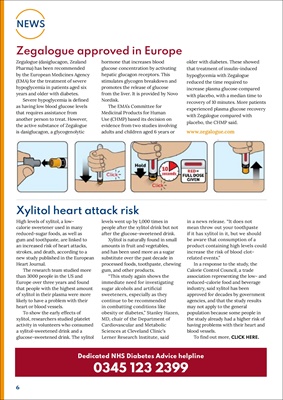
6
NEWS
Dedicated NHS Diabetes Advice helpline
0345 123 2399
Xylitol heart attack risk
High levels of xylitol, a lowcalorie
sweetener used in many
reduced-sugar foods, as well as
gum and toothpaste, are linked to
an increased risk of heart attacks,
strokes, and death, according to a
new study published in the European
Heart Journal.
The research team studied more
than 3000 people in the US and
Europe over three years and found
that people with the highest amount
of xylitol in their plasma were more
likely to have a problem with their
heart or blood vessels.
To show the early effects of
xylitol, researchers studied platelet
activity in volunteers who consumed
a xylitol-sweetened drink and a
glucose-sweetened drink. The xylitol
levels went up by 1,000 times in
people after the xylitol drink but not
after the glucose-sweetened drink.
Xylitol is naturally found in small
amounts in fruit and vegetables,
and has been used more as a sugar
substitute over the past decade in
processed foods, toothpaste, chewing
gum, and other products.
"This study again shows the
immediate need for investigating
sugar alcohols and artificial
sweeteners, especially as they
continue to be recommended
in combatting conditions like
obesity or diabetes," Stanley Hazen,
MD, chair of the Department of
Cardiovascular and Metabolic
Sciences at Cleveland Clinic's
Lerner Research Institute, said
in a news release. "It does not
mean throw out your toothpaste
if it has xylitol in it, but we should
be aware that consumption of a
product containing high levels could
increase the risk of blood clotrelated
events."
In a response to the study, the
Calorie Control Council, a trade
association representing the low- and
reduced-calorie food and beverage
industry, said xylitol has been
approved for decades by government
agencies, and that the study results
may not apply to the general
population because some people in
the study already had a higher risk of
having problems with their heart and
blood vessels.
To find out more, CLICK HERE.
Zegalogue approved in Europe
Zegalogue (dasiglucagon, Zealand
Pharma) has been recommended
by the European Medicines Agency
(EMA) for the treatment of severe
hypoglycemia in patients aged six
years and older with diabetes.
Severe hypoglycemia is defined
as having low blood glucose levels
that requires assistance from
another person to treat. However,
the active substance of Zegalogue
is dasiglucagon, a glycogenolytic
hormone that increases blood
glucose concentration by activating
hepatic glucagon receptors. This
stimulates glycogen breakdown and
promotes the release of glucose
from the liver. It is provided by Novo
Nordisk.
The EMA's Committee for
Medicinal Products for Human
Use (CHMP) based its decision on
evidence from two studies involving
adults and children aged 6 years or
older with diabetes. These showed
that treatment of insulin-induced
hypoglycemia with Zegalogue
reduced the time required to
increase plasma glucose compared
with placebo, with a median time to
recovery of 10 minutes. More patients
experienced plasma glucose recovery
with Zegalogue compared with
placebo, the CHMP said.
www.zegalogue.com